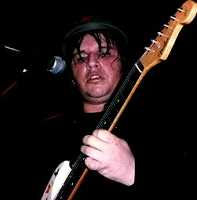|
|
|
||
| home | table of contents |feature | record reviews | live shows | news | events |archive | record label | links | contact | ||
|
Pastoral Hide and Seek
I
think we were playing live a lot during this period. There’s
some live records from that tour. The shows were not all good.
Jeffrey was getting drunker and drunker and more incoherent on
stage and it was annoying. We had been a really tight, really
great band. I remember playing and Jeffrey had taken a lot of
Valium and we were saying, “You’re playing out of
time and really slow.” And he would be insisting that he
wasn’t. And it started to get really maddening – stuff
like that. And I was still busy with The Bad Seeds and that was
not only artistically satisfying but lucrative. So it was almost
like, “I don’t have time to be fucking around with
this fucked-up-ness.” I love Jeffrey and I think he’s
an amazing thing and this band is really amazing but there’s
something really wrong – something dark and wrong. Usually
that wasn’t something that would be very daunting but this
time it wasn’t a good fucking up. It wasn’t motivating
the creativity. It was brining it down. And I think that there
was a lot of frustration with where the band was going. And the
success of the band was not getting more – it was getting
less. Mother Juno was somewhat of a comeback but after
that we didn’t sustain the kind of popularity to where we
could go to the next thing or whatever. And I think it was because
people were just sick of seeing this fucked-up man on stage and
that was no longer that entertaining after a while. Divinity
So
the Divinity
EP, after Nick Sanderson had left and we got Desi to come in and
play drums again - Desperate, after a series of drummers. It was
good because I had been losing interest in the band until Jeffrey
came up with this little crop of songs which were “Sorrow
Knows,” “Keys
to the Kingdom,” which was actually a really
old Gun Club song – I think one that might be on that Early
Warning or something. It old-old-old – even I didn’t
play on it – it might be from around Fire
of Love/Miami
time. “Richard
Speck” – that song is great. We did have
one last, for me, one last spurt of “OK, things change.
These songs are really good.” The song “Sorrow Knows”
is basically a riff that we just played and that was just something
that kind of happened. Jeffrey just had the riff and wanted to
make a really long dance song. It’s not a traditional dance
song. The way it turned out was really great. Jeffrey was really
into guitar playing so there’s a lot of soloing and stuff
going on and we had a lot of interplay and pieces of things sliding
together and going in and out of each other. So that EP gave me
a little hope for sticking around a little longer. The Great Divide I moved to Los Angeles at this point and decided to pursue my own things and that’s when I think I think I met Sally Norvell and that’s when I started working on Congo Norvell and deciding that I had to do my own trip. The Gun Club – for me – I kept seeing the popularity going away and really seeing Jeffrey going away and my heart wasn’t in it anymore. And I believe that’s probably what I told Jeffrey. I don’t even remember. Most of my departures in from bands are not big dramatic moments in life -it’s just going on to the next thing. I think I told Jeffrey, “Look I can’t do it anymore.” And he said, “OK.” In your relationship the other person decides they’re not in love with you anymore, there’s not really anything you can do to be in love with you anymore. So that was kind of the situation with that. It wasn’t that I didn’t love Jeffrey or believe in him but the circumstances were too stacked against me staying in the band and it didn’t seem worth my while and it didn’t seem like some thing that would make me happy and it didn’t seem like it was going to go anywhere. And so that was it. I said, “No more. I’m staying in LA.” He said, “Fine.” He made another record and I started Congo Norvell. Then Jeffrey and Romi’s relationship ended and Jeffrey ended up getting deported from England and ended up having to come back to Los Angeles. And Jeffrey obviously called me since he was in Los Angeles at his mother’s house. We didn’t immediately say we were going to do something. I could see Jeffrey was really bad off. I was being a friend to him because his relationship had ended. But he was getting in a bad way with drinking – like in a severely bad thing. And his mother lived up the street from that bar The Viper Room. So he would just go there and hang out every night because he could get in for free and drink for free and kind of befriended that kind of Sunset Strip nightlife sort of world. I was a bit, excuse me, "gun shy," of being around. And I was on my own trip. I believe, around this time I had started taking drugs again and a series of horrible things happened in my life. My father died. Friends were dying. There was another crazy wave of people dying of AIDS. And I was starting Congo Norvell. I would talk to him a lot more on the phone than I would see him. Some people got together and convinced Jeffrey that he should do a show at The Viper Room and they would find a band and they said to ask me - like an oldies show, sort of. You know, just play Fire of Love, Miami, whatever – just rock it out. Jeffrey asked me to do that and I was like, “Why not? That could be fun.” So he got a band together with some guys: This guy Mike Martt - who had been in Tex and The Horseheads and these guys who had been playing with Wayne Kramer – all very cool guys. And I think Mike really got it together. And I think a lot of people at The Viper Room saw something that was seriously wrong with Jeffrey’s drinking and behavior. A lot of people had seen it. His parents and his family had tried to help suggest putting him in rehab. He would go and come out and escape like a lot of people do – and insist it was OK.
We
did a few shows though. We actually played a benefit concert for
this friend of mine Travis John Alford. We were raising money
for him to make this record. He was a friend of mine who was dying
of AIDS and trying to finish this record. So me and L7
and Carla
(Bozulich) and the Geraldine
Fibbers and The Gun Club and I think even Congo Norvell
played. I did double duty. And we made concert and raised a lot
of fun and it was really good. And that show went really well. And somehow someone convinced us to do another show a few months later. Jeffrey had gone really downhill physically. He was completely bloated and really out of it. People said they really liked the concert but I remember, not so much that the band played horribly, but it was just a bad vibe. I knew something was really really bad. And that kind of was the last thing I did with Jeffrey. I think finally his family insisted that he do something about himself. People were trying to get him to go to rehab but he wouldn’t do it. So he went to his father’s house in Utah. And he was finishing writing his book Go Tell the Mountain because Henry Rollins had commissioned him to write a book. It would be a lyric book and prose and biography of the story of The Gun Club. And so he had been writing that and at this point I had moved to New York with Congo Norvell and I’d actually been talking to Jeffrey again because he was at his father’s. He was sober again. And on the phone he was the Jeffrey I had always known. And we were laughing about stuff and making a plan that, if he got his shit together again, he’d come to New York and I’d do something with him. I was looking for musicians in New York to play and just different things because he was bored as shit in Utah. One day he called me and then I didn’t call him back for a few days and then I called and I got his mother on the phone and she was like, “Oh I guess you heard…” And I was like, “Heard what?” But I knew exactly what she was going to say. She was like, “Jeffrey went into a coma and had a brain aneurism and he died yesterday.” And I was completely devastated and shocked. It’s weird because I kind of knew it could happen and everybody could see that that was what was happening, but its kind of you don’t know until it really happens. And so it was a really sad and horrible time. The last conversations I had he was very up and very happy and he was actually reading me stuff from his book like he was reading all of that stuff he was writing about channeling Isaac Hayes through the Tokyo radio tower. It was really insane stuff and he was reading that to me and we were completely hysterically laughing on the phone. And that was my last conversation with him. Which was, in hindsight, a nice last conversation to have. But yeah… So that was the end of that.
New York Night Train would like to thank Hellione for thegunclub.net the photos.
Listen to a free MP 3 of The Gun Club play "Yellow Hands" live in 1991 Continue to10. "Music to Remember Him By": Solo, Die Haut, and Congo Norvell (1988 - 1998)
Kid
Congo Powers Pt 2 home page | Kid
Congo Powers Oral History table of contents
© New York Night Train , 2005
|
||
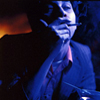
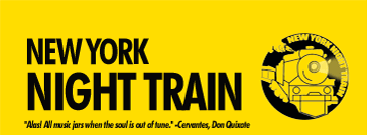
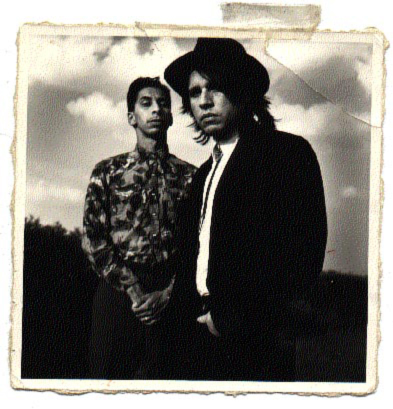
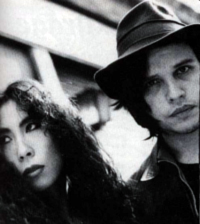 After
all the touring and stuff
After
all the touring and stuff 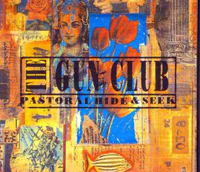
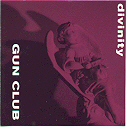 I
stuck around because it was my band with Jeffrey. And what else
were we going to do? We’d been through dark periods before
and come out of them. So I was waiting around to see if we’d
come out of it – or he would come out of it. And I think
we kind of did for a moment because then, actually Nick Sanderson
had left the band after the Pastoral Hide and Seek tour.
And we went through a series of drummers. We had this guy Nigel
who was in
I
stuck around because it was my band with Jeffrey. And what else
were we going to do? We’d been through dark periods before
and come out of them. So I was waiting around to see if we’d
come out of it – or he would come out of it. And I think
we kind of did for a moment because then, actually Nick Sanderson
had left the band after the Pastoral Hide and Seek tour.
And we went through a series of drummers. We had this guy Nigel
who was in 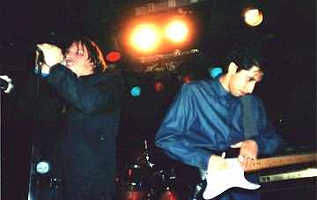 We
did a show and it was really fun and really great and people were
really excited and people were like, “You should go on tour.
You could make a lot of money. Just play these songs. This is
what people want…” And me and Jeffrey talked about
it and we said, “That really sounds like a totally miserable
idea to us.” That’s never what we were about and always
what we were running away from. Maybe in a way it probably would
have been smart because it would have been very financially lucrative.
And probably would have made a lot of people happy. But it really
just seemed like it would have been a hellish experience to be
an oldies act. I’m not big on the comeback acts –
as you can see. I’m always still trying to do something
different and that’s not my scene at all. Musically, I can
visit my past and I can draw upon my past but I’m not interested
in reliving my past – at least definitely not musically.
We
did a show and it was really fun and really great and people were
really excited and people were like, “You should go on tour.
You could make a lot of money. Just play these songs. This is
what people want…” And me and Jeffrey talked about
it and we said, “That really sounds like a totally miserable
idea to us.” That’s never what we were about and always
what we were running away from. Maybe in a way it probably would
have been smart because it would have been very financially lucrative.
And probably would have made a lot of people happy. But it really
just seemed like it would have been a hellish experience to be
an oldies act. I’m not big on the comeback acts –
as you can see. I’m always still trying to do something
different and that’s not my scene at all. Musically, I can
visit my past and I can draw upon my past but I’m not interested
in reliving my past – at least definitely not musically.